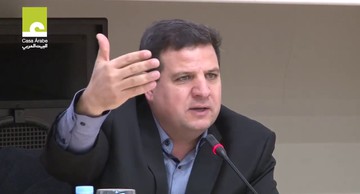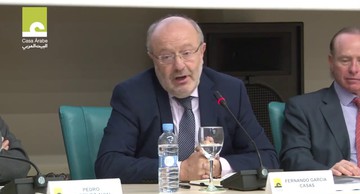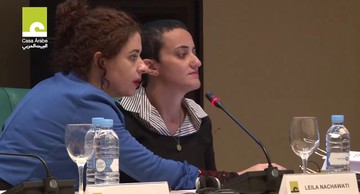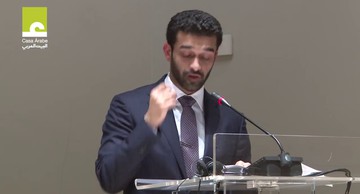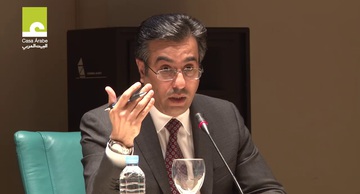

Gender Politics in Tunisia and Libya (Arabic)
نشرت 09 مارس 2021
ALL VIDEOS IN THIS CATEGORY
-
Fortieth International Day of Solidarity with the Palestinian People (ARABIC)
2017.29.11. Casa Árabe and the Diplomatic Mission of Palestine in Spain organized this conference, given by Ayman Odeh, a member of the Knesset and the head of the Joint List. It was presented by Mussa Amer Odeh, the Ambassador of Palestine in Spain, and Pedro Martínez-Avial, the General Director of Casa Árabe. Since 1977, on November 29 of each year, the UN commemorates the International Day of Solidarity with the Palestinian People. The date was selected because of its importance to the Palestinian people, given that three decades earlier, or in other words on that same date in 1947, the United Nations General Assembly enacted Resolution 181, which later came to be known as the “Partition Resolution,” in which the creation of a “Jewish State” and an “Arab State” in Palestine were stipulated, with Jerusalem as an international city. Of the two States foreseen in that resolution, up to now only one has been created: Israel. In a year when the Balfour Declaration has turned one century old, the Nakba occurred seven decades ago, and the Six-Day War took place fifty years back, this anniversary is allowing the international community to focus its attention on the fact that the matter of Palestine has not yet been resolved. Ayman Odeh (Haifa, 1975) is an attorney and politician, as well as member of the Israeli Parliament, or Knesset and the head of the Joint List, a political alliance of four parties dominated by the Arabs: Hadash, Balad, the United Arab List and Ta’al. Odeh, who identifies as a Socialist, joined Hadash and represented it in the Municipal Government of Haifa from 1998 to 2005, before becoming the party’s Secretary General in 2006. Analysts attribute to charismatic Odeh the fact that a more moderate, pragmatic face has been placed on the Arab political union. Odeh was elected to the twentieth Knesset, along with another 12 candidates from the Joint List. More info: http://en.casaarabe.es/event/fortieth-international-day-of-solidarity-with-the-palestinian-peopleنشرت 12 ديسمبر 2017 -
Women’s Economic Empowerment in MENA Countries
2017.28.12. Casa Árabe hosted the presentation of this report published by the OECD, analyzing the impact of legal frameworks on the economic empowerment of women in Algeria, Egypt, Jordan, Libya, Morocco and Tunisia. Casa Árabe the Spanish International Cooperation and Development Agency (AECID) and the Organization for Economic Cooperation and Development (OECD) are presenting the report “The Economic Empowerment of Women in a Selection of MENA Countries: The impact of the legal frameworks on Algeria, Egypt, Jordan, Libya, Morocco and Tunisia,” published last October by the OECD. In the MENA region, women account for more than half of the available labor force. Their level of education is constantly increasing, and they aspire to play a more active role in their countries’ economies. However, rates of women’s participation in the labor market and business remain at some of the lowest levels in the world. The report analyzes how the current legal frameworks in Algeria, Egypt, Jordan, Libya, Morocco and Tunisia are impacting women in different ways when they take part in economic life, whether as employees or businesspeople. It is based on a comparative analysis of the legislation in these countries. The report acknowledges the important advancements that have taken place in recent years in certain Arab countries, especially after the uprisings of 2011, with the implementation of constitutional and institutional reforms and a strengthening of women’s status. Despite these changes, ensuring enough opportunities for women is still a challenge in the six countries analyzed. The report suggests that the current discriminatory situation is a result of the convergence of a series of factors: the existence of certain still discriminatory laws against women, contradictions between different legal frameworks, a lack of any mechanisms for their implementation and a range of barriers which women face in gaining access to justice. It recommends dealing with these challenges through policies aimed at helping live up to the potential that these women hold within, while promoting inclusive growth, competitiveness and social development. The results of the report will be presented by the report’s strategic director, Carlos Conde, coordinator of the MENA-OECD Governance Program, and Luis Tejada, Director of the AECID. More info: http://en.casaarabe.es/event/women’s-economic-empowerment-in-mena-countriesنشرت 30 نوفمبر 2017 -
Voices from Post-Revolutionary Egypt (ENG)
2017.13.11. Virginia Pisano, a researcher who specializes in contemporary cultural movements in the Arab world and Egyptian journalist Lina Attalah took part in this round table discussion. The event was moderated by Leila Nachawati, a professor of Communication at the Universidad Carlos III in Madrid. The generation gap in Arab countries became apparent during the uprisings of 2011. The cultural expressions by youths in the streets, from Tunis to Sanaa and Manama, made creativity a political virtue for moving forward in terms of freedom of expression and other individual liberties. Graffiti, street theater, slogans and new compositions by urban troubadours demonstrated a dynamic power in 2011 that surprised not only their parents, but also youths themselves. Six years after the uprising in Tahrir Square, now is a good time to perform a review of the legacy, innovation and portrayal of Arab cultures and reflect upon these events. Virginia Pisano (Milan, 1983) has a degree in History from the Sorbonne (Paris) and in Middle East Studies from the School of Oriental and African Studies (SOAS) in London. She has worked for various cultural organizations as an art project coordinator, focusing on the Arab world and the Mediterranean space, including the Medinea network at the Festival of Aix, the AlefBa project by the Royaumont Foundation and the cultural translation project Transeuropéennes. Along with her research and cultural management activities, Virginia Pisano is currently working towards a career in radio documentary production and is specializing in today’s Egyptian music. Lina Attalah is a journalist and well-known figure in the Egyptian media. Editor of the website Mada Masr, she was formerly an editor for the Egypt Independent. Attalah studied journalism at the American University of Cairo and has worked on many different projects based on research using multimedia outputs. She has written for the English language version of Al-Masry Al-Youm, Reuters, the Cairo Times, the Daily Star and the Christian Science Monitor. She worked as a radio producer and campaign coordinator for the BBC World Service in 2005. She is active in the fight against restricting honest journalism and has more than 42 million followers on Twitter. More info: http://en.casaarabe.es/event/voices-from-post-revolutionary-egyptنشرت 22 نوفمبر 2017 -
The first Middle East World Cup: An opportunity for co-existence through sports
The Secretary General of the Supreme Committee for Delivery and Legacy (Qatar 2022), Hassan Al Thawadi, gave this conference in Madrid on October 31. He was accompanied by Juan Luis Larrea Sarobe, president of Spain's Royal Football Federation. At this conference, Al Thawadi, who was introduced by the General Director of Casa Árabe, Pedro Martínez-Avial, dealt with the importance held by soccer’s World Cup event in 2022, taking place for the first time ever in the Middle East, in an Arab country. This milestone has turned the major event into something truly special this time around, and it will be a great opportunity to achieve understanding between peoples of different cultures, beliefs and past histories. Hassan Al Thawadi highlighted soccer’s potential as a tool to achieve unity, with historical and contemporary references, as well as discussing how Qatar is working to make the 2022 World Cup memorable as a historical event for the region. Hassan Al Thawadi has been, since March of 2011, the Secretary General of the Supreme Committee for Delivery and Legacy of Qatar, the organization responsible for coordinating the public and private entities that will be completing the infrastructures and development projects for hosting the World Cup in Qatar in 2022. Prior to this, he was a senior executive on Qatar’s 2022 Bid Committee, where he worked alongside the Committee’s Chairman, Sheikh Mohammed bin Hamad Al Thani, in the end achieving Qatar’s selection as the World Cup host. Educated as a lawyer, he has also been a general advisor of the Qatar Invest Authority (QIA) and Qatar Holding, entities founded by the State of Qatar in 2005 to strengthen the national economy through diversification and making strategic long-term investments. He is also a member of several significant boards of trustees and committees in Qatar, including Qatar University (College of Business and Economics), Qatar Chamber for Commerce and Industry, Qatar International Islamic Bank, Msheireb Properties and Hassad Foods. More info: http://en.casaarabe.es/event/the-first-middle-east-world-cup-an-opportunity-for-co-existence-through-sportsنشرت 02 نوفمبر 2017 -
Human Rights in Qatar (ARABIC)
10.19.2017. The president of Qatar’s National Human Rights Committee, Ali bin Samikh Al-Marri, gave this conference at the Casa Árabe headquarters in Madrid. Al-Marri was introduced by Pedro Martínez-Avial, the General Director of Casa Árabe. The outlook of Qatar’s National Human Rights Committee is based on the conviction that human rights constitute one of the most important matters in the national community, in particular, and the international community in general. Acknowledging these rights, whether they may be political, civil, cultural, social or economic, and whether they belong to individuals or groups, means making a commitment to equality, justice, freedom and human dignity for all human beings with no discrimination. Qatar’s National Human Rights Committee is an official national committee with a special status that seeks to increase awareness and educate people about rights, providing the necessary protection and support to individuals while developing skills. Ali bin Samikh Al-Marri. He has been the president of Qatar’s National Human Rights Committee (NHRC) since 2009, and as of 2015 is the Vice-President of the Asia-Pacific Forum for National Human Rights Institutions (APF), whose headquarters is located in Sidney, Australia. Similarly, he is a member of the Advisory Board and Scientific Committee of the Arab Institute for Human Rights, with headquarters in Tunis. He was elected Chairman of the Arab Commission for Human Rights at the Arab League in 2012. He earned a PhD in Philosophy and Political Science. More info: http://en.casaarabe.es/event/human-rights-in-qatarنشرت 02 نوفمبر 2017

